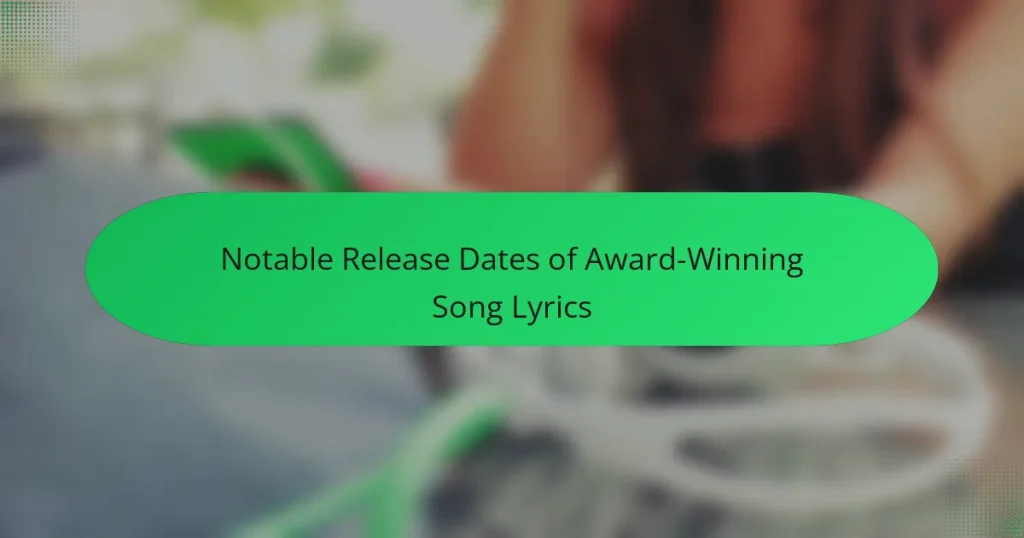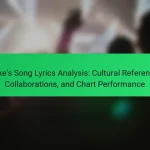The article focuses on notable release dates of award-winning song lyrics, highlighting significant songs and their achievements. Key examples include “Bridge Over Troubled Water” by Simon & Garfunkel, released on March 3, 1970, and awarded the Grammy for Song of the Year in 1971, as well as “What’s Love Got to Do with It” by Tina Turner, released on June 25, 1984, winning the Grammy for Record of the Year in 1985. The analysis also addresses trends in musical innovation and cultural relevance, emphasizing the impact of release timing on a song’s commercial success and award nominations. Historical data reveals that strategic release periods can enhance visibility and recognition in the competitive music industry.
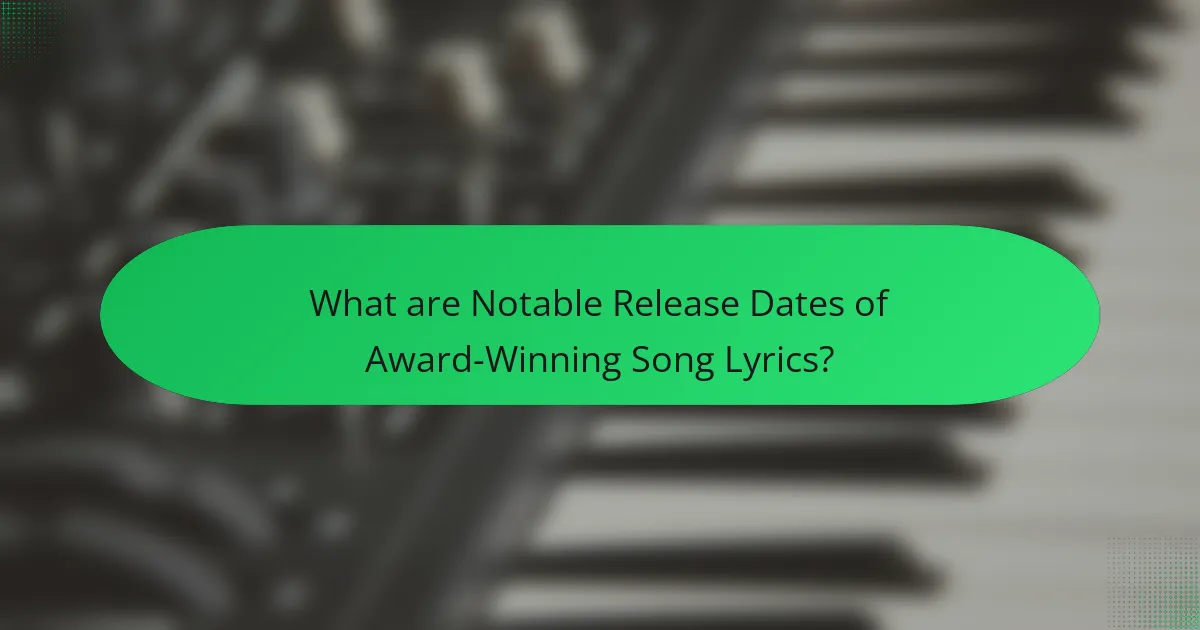
What are Notable Release Dates of Award-Winning Song Lyrics?
Notable release dates of award-winning song lyrics include March 3, 1970, for “Bridge Over Troubled Water” by Simon & Garfunkel. This song won the Grammy Award for Song of the Year in 1971. Another significant date is June 25, 1984, when “What’s Love Got to Do with It” by Tina Turner was released. It won the Grammy for Record of the Year in 1985. Additionally, November 21, 1995, marks the release of “Killing Me Softly with His Song” by The Fugees, which won the Grammy for Best R&B Performance in 1997. Each of these songs achieved critical acclaim and recognition through prestigious awards, cementing their place in music history.
Why are release dates important in the context of song lyrics?
Release dates are important in the context of song lyrics because they provide temporal context for the themes and messages conveyed. The release date can influence how listeners interpret the lyrics based on societal events or cultural trends at that time. For example, songs released during significant historical moments often reflect the emotions and sentiments of that period. Additionally, the timing of a release can affect its commercial success and audience reception. Songs like “Fight the Power” by Public Enemy, released in 1989, resonate with the civil rights movements of that era. Thus, understanding the release date helps in analyzing the impact and relevance of the song’s lyrics.
How do release dates influence the reception of song lyrics?
Release dates significantly influence the reception of song lyrics. The timing of a release can align with cultural events or societal moods, enhancing relatability. For example, songs released during social movements often resonate more deeply with listeners. This phenomenon can lead to increased popularity and critical acclaim. Historical context also plays a role; lyrics that address contemporary issues may gain traction when released at pivotal moments. Additionally, strategic release dates can maximize media coverage and listener engagement. For instance, dropping a single just before an award show can create buzz and anticipation. Overall, the timing of a song’s release is crucial in shaping its impact and reception.
What role do release dates play in award nominations?
Release dates significantly influence award nominations. The timing of a release can determine a song’s visibility and relevance during the voting period. Many award shows have specific eligibility windows. For example, the Grammy Awards consider songs released within the eligibility year. This timeframe affects how songs are remembered by voters. A song released closer to the nomination date may have a stronger impact due to recency bias. Additionally, strategic release dates can align with promotional events, increasing a song’s chances of being nominated. Historical patterns show that songs released in the fall often perform better. This is due to heightened media attention and audience engagement during that season.
What criteria define award-winning song lyrics?
Award-winning song lyrics are defined by emotional resonance, originality, and storytelling quality. Emotional resonance captures listeners’ feelings and connects on a personal level. Originality ensures the lyrics present unique perspectives or themes. Storytelling quality involves a coherent narrative that engages the audience. These criteria are often evaluated by industry professionals during awards. For example, the Grammy Awards consider these elements when selecting nominees and winners.
How are song lyrics evaluated for awards?
Song lyrics are evaluated for awards based on criteria such as originality, creativity, and emotional impact. Judges assess the lyrical content for its artistic expression and thematic depth. They consider how well the lyrics convey the song’s message and connect with the audience. The evaluation process often includes a review by industry professionals and peers. Specific awards may have distinct criteria that highlight different aspects of songwriting. For instance, the Grammy Awards emphasize innovation and overall contribution to the music industry. These evaluations are typically conducted through a combination of voting and expert panels.
What are some examples of awards for song lyrics?
Examples of awards for song lyrics include the Grammy Award for Best Song Written for Visual Media. This award recognizes outstanding lyrics in songs associated with films, television, or other visual media. Another example is the American Society of Composers, Authors, and Publishers (ASCAP) Awards. These awards honor songwriters for their contributions to music, including lyric writing. The Billboard Music Awards also recognize excellence in songwriting, including lyrics. The Ivor Novello Awards specifically celebrate British songwriters and composers, with categories focused on lyric writing. These awards highlight the importance of lyrics in the music industry.
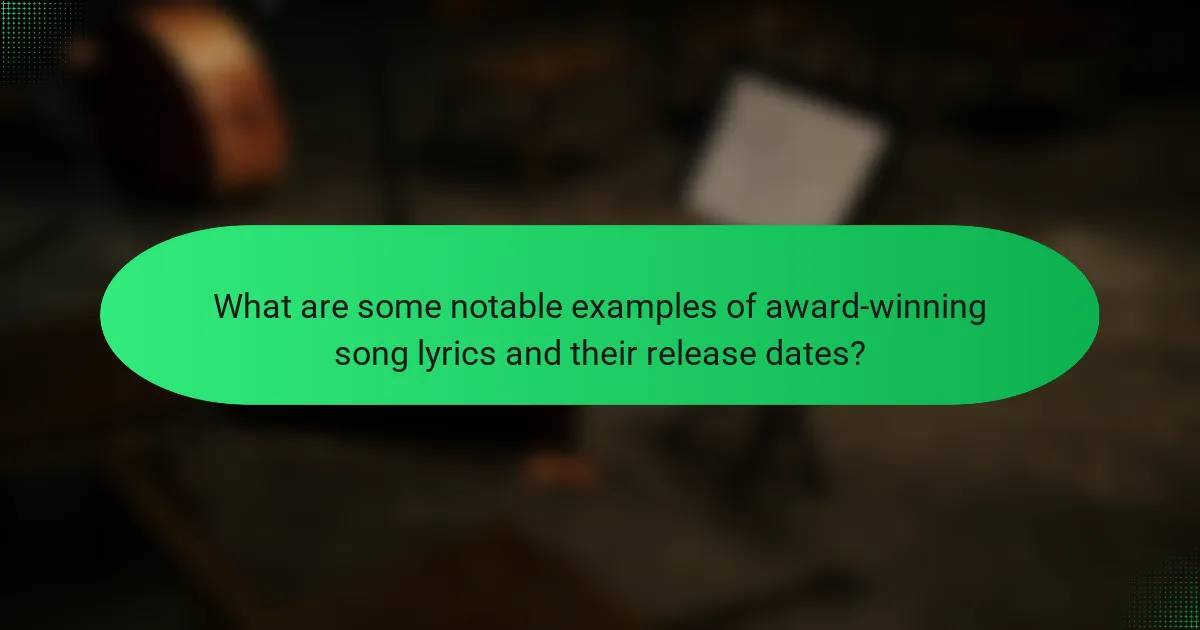
What are some notable examples of award-winning song lyrics and their release dates?
“Rolling in the Deep” by Adele won the Grammy Award for Record of the Year in 2012. It was released on November 29, 2010. “The Sound of Silence” by Simon & Garfunkel won the Grammy Award for Best Contemporary Folk Performance in 1965. It was released on September 17, 1964. “Lose Yourself” by Eminem won the Academy Award for Best Original Song in 2003. It was released on October 28, 2002. “Shape of You” by Ed Sheeran won the Grammy Award for Song of the Year in 2018. It was released on January 6, 2017. “Someone Like You” by Adele won the Grammy Award for Best Pop Solo Performance in 2012. It was released on January 24, 2011.
Which songs have received major awards and what are their release dates?
“Shape of You” by Ed Sheeran received a Grammy Award for Song of the Year in 2018. It was released on January 6, 2017. “Rolling in the Deep” by Adele won the Grammy for Record of the Year in 2012. This song was released on November 29, 2010. “Uptown Funk” by Mark Ronson featuring Bruno Mars received the Grammy for Record of the Year in 2016. It was released on November 10, 2014. “Someone Like You” by Adele won the Grammy for Best Pop Solo Performance in 2012. This track was released on January 24, 2011. “Hello” by Adele received the Grammy for Record of the Year in 2017. It was released on October 23, 2015.
How do the release dates correlate with the awards won?
Release dates of songs can significantly influence the awards won. Songs released closer to major award ceremonies often receive increased visibility. For example, many Grammy-winning songs are released in the fall, aligning with the eligibility period. This timing allows for greater promotion and public engagement. Additionally, songs released during peak seasons may benefit from less competition. Historical trends show that songs released in the fourth quarter frequently dominate nominations. This correlation suggests that strategic release timing can enhance a song’s chances of winning awards.
What themes are prevalent in award-winning song lyrics from specific years?
Award-winning song lyrics from specific years often reflect themes of love, social justice, and personal struggle. For example, in 2020, many songs addressed the global pandemic and racial equality. In 2019, themes centered around empowerment and resilience were prevalent. In 2018, introspection and mental health were significant topics in many award-winning tracks. Each year showcases a unique blend of these themes, influenced by cultural and societal events. Analysis of Grammy winners reveals these recurring themes across different genres and styles.
How do different genres influence the release dates of award-winning song lyrics?
Different genres influence the release dates of award-winning song lyrics by aligning with seasonal trends and audience preferences. For instance, pop songs often release in the summer to capitalize on vacation listening. Country music typically sees releases in the fall, coinciding with harvest festivals and family gatherings. Hip-hop frequently targets the end of the year for awards season visibility. Historical data shows that songs released in alignment with these trends have higher chances of winning awards. For example, the Grammy-winning song “Uptown Funk” was released in November, strategically positioned for year-end accolades. Thus, genre characteristics significantly dictate optimal release timing for award-winning potential.
What patterns can be observed in release dates across genres?
Release dates across music genres often follow seasonal and cultural trends. For example, pop and hip-hop albums frequently release in the spring and summer. This timing aligns with festival seasons and increased consumer spending. Conversely, rock and alternative genres often see releases in the fall. This pattern coincides with back-to-school shopping and holiday preparations.
Additionally, holiday-themed music typically releases in late summer or early fall. This allows ample promotion time before the holiday season. Research shows that certain genres peak during specific months. For instance, country music sees a spike in releases during the summer months.
Statistical analysis indicates that major award-winning songs often debut in the fourth quarter. This timing capitalizes on end-of-year award considerations. These patterns reflect strategic marketing decisions aimed at maximizing listener engagement and sales.
How do seasonal trends affect the release of award-winning songs?
Seasonal trends significantly influence the release of award-winning songs. The music industry often aligns releases with seasonal events to maximize impact. For instance, summer releases target increased listener engagement during vacation months. Conversely, holiday-themed songs are strategically released in late fall to capture festive moods. Historical data shows that many Grammy-winning songs debuted in January, coinciding with the awards season, enhancing their visibility. Additionally, spring releases may benefit from new music festivals, providing platforms for exposure. These strategic timings reflect industry patterns that aim to leverage seasonal trends for commercial success.
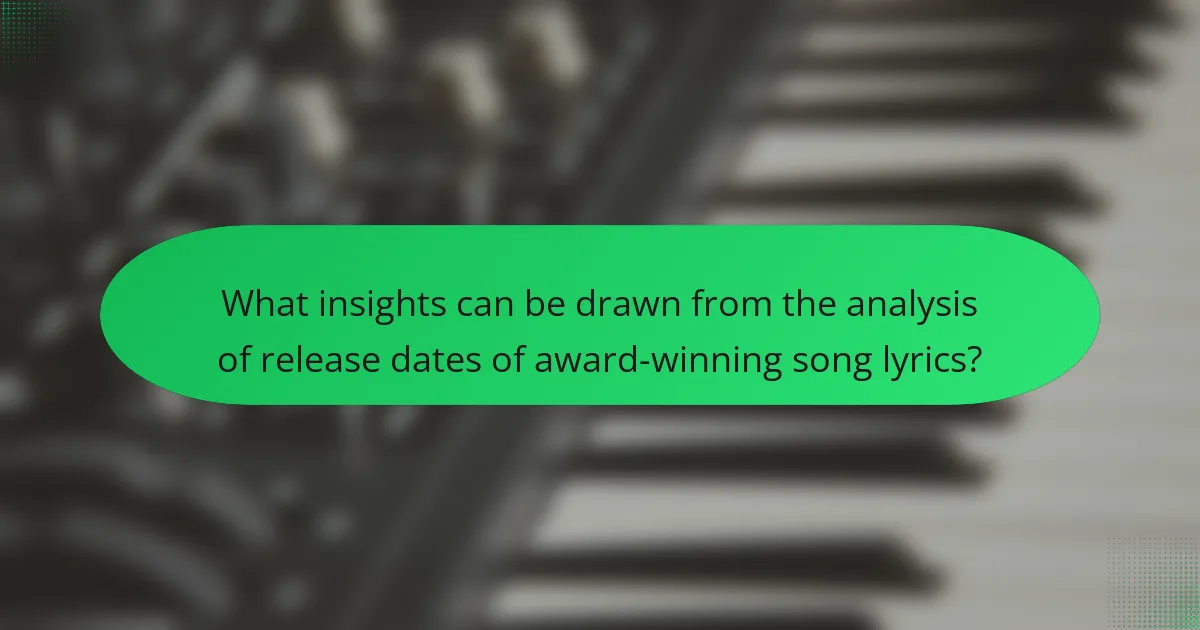
What insights can be drawn from the analysis of release dates of award-winning song lyrics?
The analysis of release dates of award-winning song lyrics reveals trends in musical innovation and cultural relevance. Many award-winning songs are released during specific seasons, often aligning with major music events or holidays. For example, songs released in the fall frequently gain traction due to increased media attention around award shows. Additionally, the timing of releases can impact commercial success, as songs launched during peak listening periods often achieve higher chart positions. Historical data shows that songs released in the first quarter of the year often receive nominations for major awards due to the eligibility period. This correlation suggests that strategic release timing can enhance a song’s visibility and recognition. Such insights highlight the importance of timing in the music industry’s competitive landscape.
How can understanding release dates benefit songwriters and artists?
Understanding release dates can significantly benefit songwriters and artists. Timely releases can align with cultural events or seasons, maximizing audience engagement. Historical data shows that songs released during holiday seasons often achieve higher chart positions. For instance, Mariah Carey’s “All I Want for Christmas Is You” gained popularity due to its strategic holiday release. Additionally, being aware of industry trends helps artists avoid competing with major releases. This strategic timing can enhance visibility and streaming numbers. Overall, understanding release dates allows songwriters and artists to optimize their impact in the music market.
What strategies can artists use based on historical release date trends?
Artists can use historical release date trends to optimize their release schedules. Analyzing past successful releases reveals patterns in timing. For instance, many hit songs are released in late spring or early summer. This timing aligns with increased listener engagement during warmer months. Additionally, artists should consider aligning releases with major holidays or events. For example, songs released around Christmas often achieve significant chart success. Examining data from Billboard charts shows that certain weeks consistently yield higher sales. Artists can also leverage social media trends that coincide with these release dates. By strategically timing their releases, artists can enhance visibility and maximize impact.
How can songwriters leverage award-winning song lyrics as a learning tool?
Songwriters can leverage award-winning song lyrics as a learning tool by analyzing their structure and themes. They can study how successful lyrics convey emotions and tell stories effectively. This analysis can reveal techniques like rhyme schemes and imagery usage. Examining award-winning songs can also highlight the importance of word choice and phrasing. Songwriters can identify trends in lyrical content that resonate with audiences. Additionally, they can learn about the impact of cultural and social contexts on songwriting. By dissecting these elements, songwriters can enhance their own craft. Ultimately, this practice can lead to improved songwriting skills and greater creativity.
What practical tips can be applied when considering release dates for new songs?
Choose a release date that avoids major holidays. This helps in maximizing audience engagement. Analyze the competition by checking other artists’ release schedules. Timing your release when fewer songs are launched can increase visibility. Consider seasonal trends; summer months often see higher streaming numbers. Use data analytics to identify peak listening times for your target audience. Collaborate with marketing teams to align promotional efforts with the release date. Lastly, ensure that the release date allows sufficient time for promotion and buildup.
The main entity of this article is “Notable Release Dates of Award-Winning Song Lyrics.” The article provides a detailed examination of significant release dates for songs that have received prestigious awards, highlighting their influence on cultural and societal contexts. It discusses the importance of release dates in shaping the reception of song lyrics, their correlation with award nominations, and the criteria that define award-winning lyrics. Additionally, the article explores how different genres and seasonal trends affect release strategies, offering insights for songwriters and artists to optimize their impact in the music industry.
